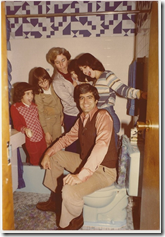Write a book
/Earlier this month, Nathan Bransford asked: “Can anyone with enough practice be a good writer? What about a great writer? Is there a part of writing that is innate or can it be learned by anyone?”
As a teacher, I have to believe that with enough work, any reasonably intelligent person can become a good writer. It’s what I tell my students, and it’s what I believe. Give me a hard working, dedicated student and enough time and I can help that kid become a good writer.
Writing is hard work, but it’s not rocket science.
I am fond of telling people that I am not a very impressive person, and in many ways, this is true. I once thought of authors as brilliant, talented, almost other-worldly beings. Now that I have joined the club, their stature has diminished considerably. I can’t help but think that if I can do it, anyone can do it.
It turns out that authors are ordinary people like me.
In fact, I always tell the people who attend my readings and appearances that they should be writing, regardless of what they perceive their ability level to be. I firmly believe that everyone has a story to tell, whether it is fiction, memoir or something else entirely. In fact, based upon the success that I’ve had in the publishing world, I can’t understand why more people are not working on a book.
You never know when you might strike gold.
I like to say that publish or not, finishing a book is a major accomplishment. It’s a goal that many, many people have but very few ever achieve. People spend their lives thinking about writing a book, envisioning their story, imagining the finished product, but never getting around to putting words to paper.
Finishing a book places you well ahead of this enormous majority.
And with the self-publishing outlets that exist for authors today, finishing a book doesn’t mean that it has to remain on your hard drive or in a stack of printed pages, even if you can’t find a publisher who is interested. Design a cover and a layout and print as many books as you’d like. Sell them from the trunk of your car, give them out as gifts or pass it onto your children as a timeless piece of you.
Either way, you will have written a book. That is quite an accomplishment.



